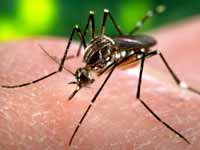KUALA LUMPUR, Oct. 10- Dengue cases have doubled over the past 10 years, with the situation turning significantly worse this year compared with the previous year, a health official said.
The disease has in fact become the fastest-growing mosquito- born disease in the world, Shin Young-soo, World Health Organization (WHO) Regional Director for the Western Pacific, told a press conference here on Sunday.
While the reason for the deteriorating situation was unknown, Shin said it could be caused by rising temperature, rain amount and urbanization.
However, the increasing number recorded could be due to better surveillance developed over the years, said Shin.
While pointing out that the dengue situation has worsened over the last three years in Malaysia, Shin also said that the Philippines and Laos were severely attacked by the disease this year.
According to the Malaysian Health Ministry, a total of 37,419 dengue cases were reported in the country from January to Oct. 2, an increase of 17 percent or 5,411 cases compared with 32,008 cases recorded in the same period last year.
During the period, 117 death cases were reported, a surge of 65 percent or an increase of 46 cases compared with the same period last year.
Earlier this week, the WHO warned that 2.5 billion people around the globe are estimated to be threatened by the fatal disease, with 70 percent of the cases originating from Asia.
According to the WHO, many dengue cases were reported in Southeast Asian and South Asian countries during the first eight months of 2010, with 60,000 cases recorded in Indonesia, 58,000 in Thailand and 27,000 in Sri Lanka.
Meanwhile, Malaysian Health Minister Liow Tiong Lai said that the ministry had obtained the approval from the Malaysian National Biosafety Board to release the genetic-modified mosquitoes into the environment.
The Malaysian government is researching on the possibility of using genetic-modified mosquitoes to eradicate the spread of dengue, a way deemed most effective and fast in reducing dengue cases.
According to the ministry, the genetic-modified mosquitoes, all male, will still mate with other female mosquitoes but the wigglers, or mosquito larvaes, will not be able to survive.
Earth becoming a disease hot spot : The warming earth is making us sick. Rising temperatures, frequent floods and prolonged droughts are ideal conditions for infectious diseases to spread. "Global warming is fuelling epidemics in areas which are unprepared. We're seeing the emergence of new diseases around the world. Old diseases are also coming back with a vengeance," Climate change has dramatically changing infection trends.
DENGUE DEATH CASES INCREASES BY 65% IN 2010
SAVE THE WORLD - STOP GLOBAL WARMING

Either You're With Me or You're Against Me in Stopping Global Warming!
Global Warming Articles
Let's Go Green & Save The World : Mentor Gemilang
The Truth Hurts - Truth is such a rare thing, it is delighted to tell it.

You can fool some of the people all of the time, and all of the people some of the time, but you can not fool all of the people all of the time.
Most truths are so naked that people feel sorry for them and cover them up, at least a little bit.
Truth always rests with the minority, and the minority is always stronger than the majority, because the minority is generally formed by those who really have an opinion, while the strength of a majority is illusory, formed by the gangs who have no opinion
Let's Go Green - Mentor Gemilang 1 - Visitors from 90 Countries
LATEST NEWS
Are u protected against Influenza A(H1N1)?
Repentance (At Taubah)
We can never be perfect since even prophets have at times made mistakes. Repentance means to abandon one's rebelliousness and arrogance before God and to stop deliberately disregarding His commandments without feeling any shame. Repentance also means to humbly hope for the mercy of God and to fear His judgment while doing the best one can to fulfill divine wishes within the limits of one's human weaknesses.


